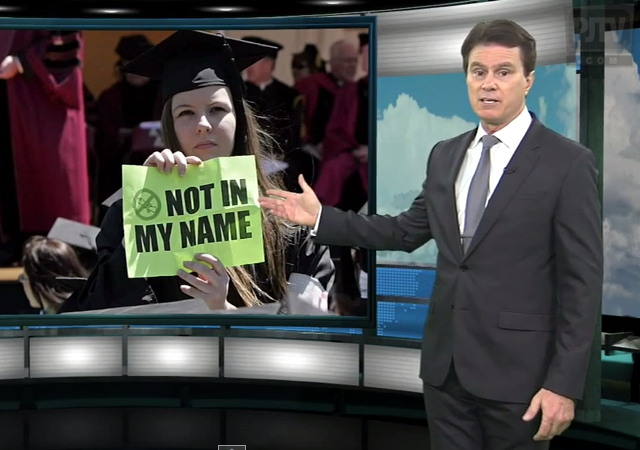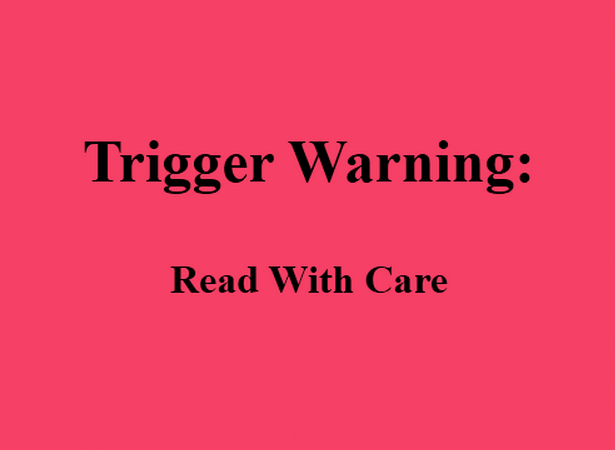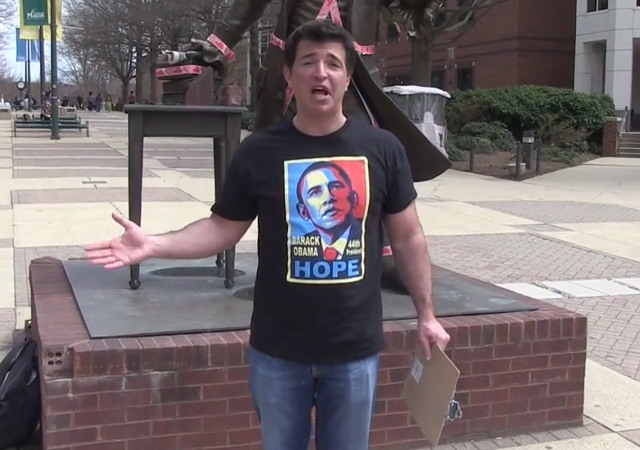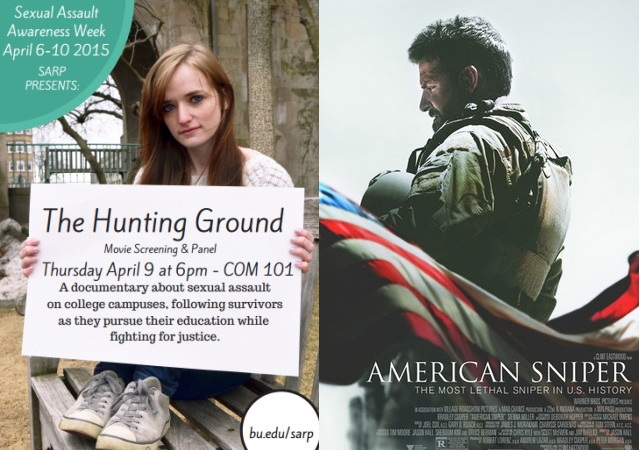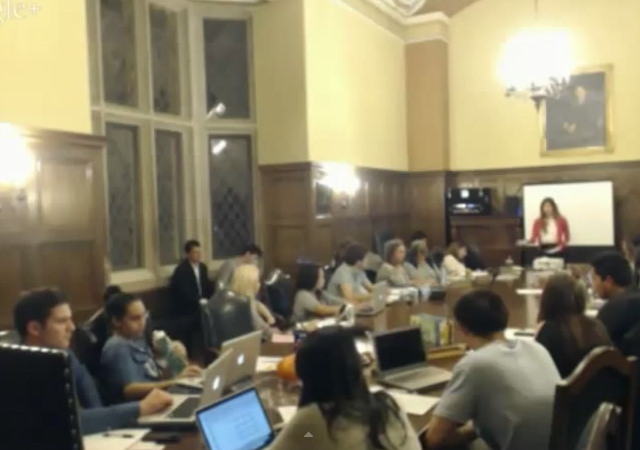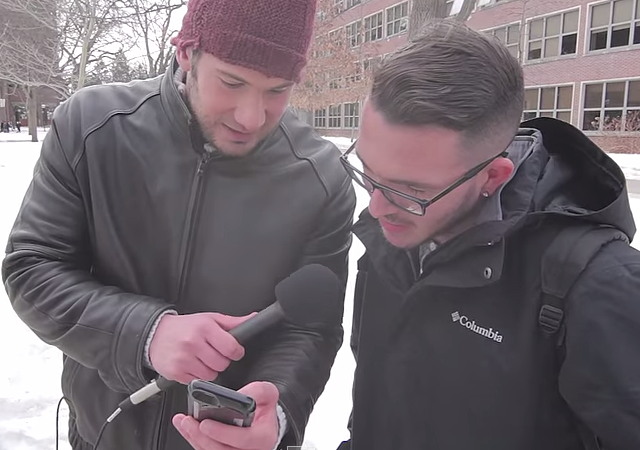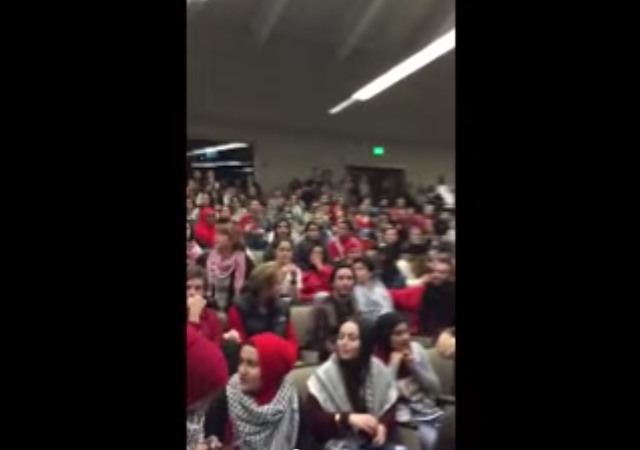College Insurrection Tag
Trigger Warnings Week at College Insurrection
Your weekly report from the world of higher education....
This Trigger Warning needs its own Trigger Warning
The fragile college student mind is getting more fragile by the day. As if the normal run of political correctness were not enough, we now have “Trigger Warnings” — the notion that students need to be warned that the material they are about to read in class may “trigger” emotional upset.... Of course, how the trigger is defined says much about the theory behind the movement — it almost always serves left-wing critical race and gender theories .... The Trigger Warning movement is all about enforcing a conformity of thought by forcing faculty and others to identify and warn about politically incorrect ideas.The Trigger Warning in the Featured Image was displayed at Oberlin when Christina Hoff Sommers spoke: [caption id="attachment_124731" align="alignnone" width="550"]
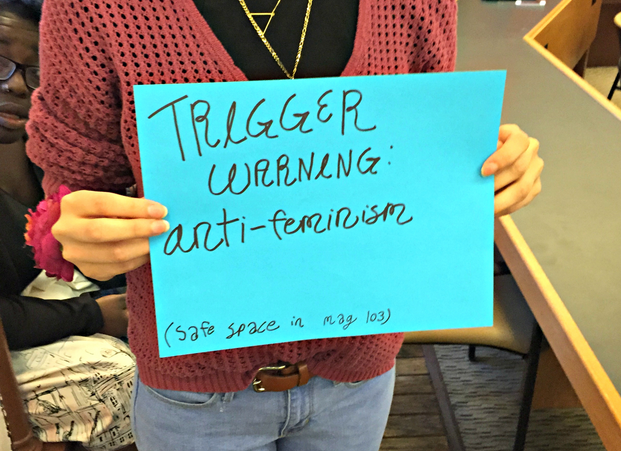 Image credit: Clare Boothe Luce Policy Institute[/caption]
UT-Arlington Philosophy Prof. Keith Burgess-Jackson has come up with a Trigger Warning for his Philosophy of Religion class.
He writes:
Image credit: Clare Boothe Luce Policy Institute[/caption]
UT-Arlington Philosophy Prof. Keith Burgess-Jackson has come up with a Trigger Warning for his Philosophy of Religion class.
He writes:
I've decided to include a trigger warning in each course syllabus, beginning this fall. Here is the trigger warning for my upcoming Philosophy of Religion course. What do you think?What do I think? I think the precious, fragile souls demanding Trigger Warnings will demand that you put a Trigger Warning on this Trigger Warning. Here we go:
Oberlin Radical Feminists Freak Out at Christina Hoff Sommers
So let’s engage in some radical, beautiful community care, support and love. Let’s make space for everyone to engage at whichever level they want/need. Let’s come through for each other, both now and in the future. Trauma is an experience that threatens a person’s bodily, spiritual and emotional integrity. The psychological, emotional and somatic impacts extend beyond the experience of trauma. Healing is a process that looks different for each person. Let’s make space to care for all experiences of trauma and to respect those we care for. Let’s focus our energy on taking care of each other and ourselves. Let’s make her talk irrelevant in the face of our love, passion and power.
Christina Hoff Sommers gets Trigger Warnings at Georgetown
Spoke at Georgetown last night. Lots of trigger warnings and safe spaces. pic.twitter.com/04z7A7WVxn
— Christina H. Sommers (@CHSommers) April 17, 2015
Here are some more tweets via Twitchy:
Posted outside my lecture at Georgetown last night. I suggested feminist jazz hands instead of triggering clapping. pic.twitter.com/PdsuOtwozU
— Christina H. Sommers (@CHSommers) April 17, 2015
Minimum Intelligence Week at College Insurrection
Your weekly dispatch from the world of higher education....
Film Studies Week at College Insurrection
Your weekly report from the world of higher education....
Intellectual Implosion Week at College Insurrection
Your weekly report from the world of higher education....
“We have a different hate campaign each week.”
Public Shaming Week at College Insurrection
Your weekly dispatch from the world of higher education....
National Debt Week at College Insurrection
Your weekly report from the world of higher education....
Unconstitutional Expulsion Week at College Insurrections
Your weekly dispatch from the world of higher education....
Conservatives on Campus Week at College Insurrection
Your weekly report from the world of higher education....
Student Government Week at College Insurrection
Your weekly dispatch from the world of higher education....
Suppressed Speech Week at College Insurrection
The American college campus should be a place that celebrates free speech. And yet...
Ridiculous Requirements Week at College Insurrection
Your weekly report from the world of higher education....
Divestment Derangement Week at College Insurrection
Your weekly dispatch from the world of higher education....
Accurate Analysis Week at College Insurrection
Your weekly dispatch from the world of higher education....
Donations tax deductible
to the full extent allowed by law.
CONTRIBUTORS
- William A. Jacobson
Founder
- Kemberlee Kaye
Sr. Contrib Editor
- Mary Chastain
Contrib Editor
- Fuzzy Slippers
Weekend Editor
- Mike LaChance
Higher Ed
- Leslie Eastman
Author
- Vijeta Uniyal
Author
- Stacey Matthews
Author
- Jane Coleman
Author
- James Nault
Author
- Mandy Nagy
Editor Emerita
- Learn more about the Contributors

